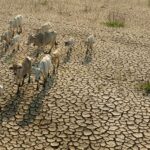Wealthy Nations Exporting Extinction & Destroying Biodiversity At Alarming Rate: Study

High-income countries are responsible for 15 times more biodiversity loss abroad than within their borders, with tropical forests in places like Brazil and Indonesia bearing the brunt
A recent study has revealed that wealthy nations are significantly contributing to global biodiversity loss by driving destruction in the world’s most vulnerable ecosystems. According to research published in Nature, high-income countries are responsible for exporting extinction by causing 15 times more biodiversity damage internationally than within their borders.
The study found that countries with high levels of consumption, such as the United States, Germany, France, Japan, China, and the United Kingdome, are directly linked to the destruction of habitats in biodiversity hotspots, including tropical forests in places like Indonesia, Brazil, and Madagascar. These forests, which house thousands of species of birds, mammals, and reptiles, are being cleared to meet the demand for products like beef, palm oil, timber, and soybeans.
In particular, the US was found to be responsible for 3 per cent of global deforestation outside its borders, underscoring the profound impact that consumption patterns in wealthier nations have on global ecosystems. Researchers noted that much of this destruction is happening in regions with significant forest biodiversity, making the loss particularly devastating.
The study looked at the impact of 24 high-income nations on over 7,500 forest-dependent species between 2001 and 2015.
Adding to concerns, a separate study by the University of Cambridge has warned that efforts to conserve land in temperate regions, like the UK, could exacerbate biodiversity loss globally. These conservation efforts, while important, could result in a ‘biodiversity leak,’ where the shortfall in food and wood production would likely shift to less-regulated areas, further threatening ecosystems in Africa and South America.
Both studies highlight the need for a more nuanced approach to conservation—one that balances the need to protect natural habitats while addressing the global demand for agricultural products. Researchers are calling for sustainable production practices and stricter regulations to curb the global destruction of biodiversity.
As nations begin to recognize the scale of their global impact, experts are urging for more targeted conservation efforts and a rethinking of how resources are used, both within borders and beyond.



























































































































































































































































































































































































































































































































































































































































































































































































































































































































































































































































































































































































